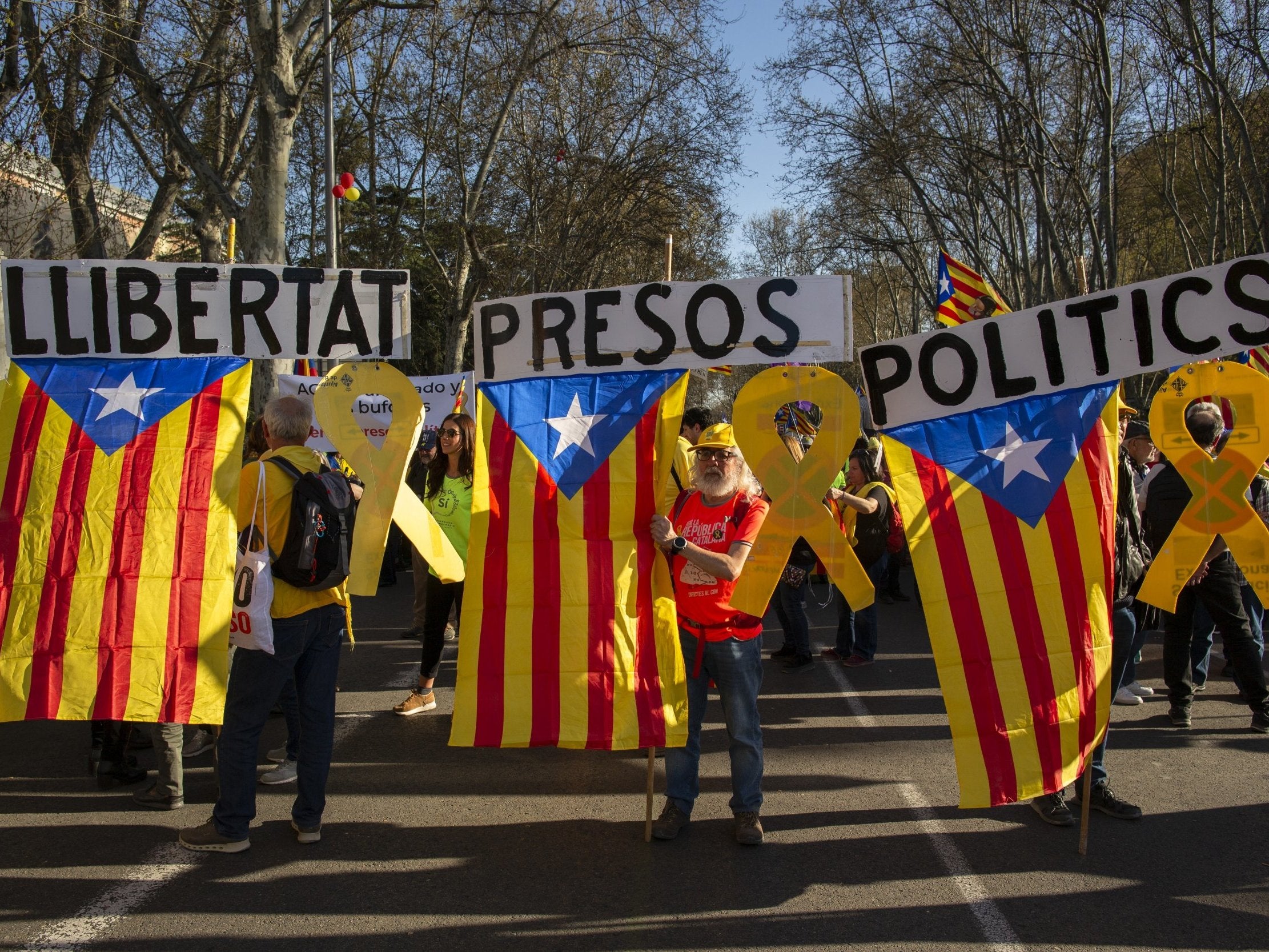Spain’s ‘trial of the century’ could help the far right in upcoming elections
A quirk of the Spanish justice system allows anyone to become a co-accuser and take part in court proceedings, as Vox have done in the Catalan leaders’ trial, gaining a golden opportunity to put their anti-separatist agenda on display

When 12 Catalan pro-independence leaders filed into Spain’s Supreme Court in Madrid this February and sat down on its smart, burgundy-coloured benches, media and public interest in the “trial of the century,” as it has been dubbed here in Spain, could not have been higher.
The 12, including former Catalan vice-president Oriol Junqueras, face charges including rebellion, sedition and the misuse of public funds, mostly linked to the illegal pro-independence referendum in October 2017. Rebellion alone carries a maximum prison sentence of 25 years.
Watching from outside the police lines in February – beyond the bag checks, the barriers and the block on anybody without accreditation from approaching any closer than 100 metres of the court’s front doors – I could see a group of some 50 hard-right sympathisers chanting slogans about the unity of Spain and yelling insults at the 100 or so pro-Catalan supporters on the other side of the street.
Credit given for originality where it’s is due, the high point of the right-wing demonstration came when they unfurled a massive poster of the 12 separatist leaders caricatured as demons; complete with horns, pitchforks and tails.
What was telling was how the bulk of the general public that day simply gave the protestors a quick glance at most and moved on. However, the message inside the courts from Spain’s new hard-right party, Vox, is much harder to ignore.
That’s because a quirk of the Spanish justice system allows anyone to become a co-accuser and take part in court proceedings, as Vox have done in the Catalan leaders’ trial, gaining a golden opportunity to put their hardline, anti-separatist agenda on display.
Vox insist their role in the trial is not political.
Yet with electoral promises as extreme as arresting the current president of Catalonia, the pro-independence Quim Torra, and making Catalonia’s separatist parties illegal, Vox’s mere presence in a case handling Spain’s biggest constitutional crisis in four decades carries massive symbolic weight. That’s particularly true when one of Vox’s lawyers in the trial, Javier Ortega Smith, is also their Secretary General.
Seeing Vox cross-question the Catalan separatists on a near-daily basis in the country’s biggest court provides further “proof” to the right-wing segment of the Spanish electorate most outraged by the Catalan pro-independence campaign that the new extremists are the genuine keepers of Spain’s pro-unity flame.
The trial also boosts Vox’s profile across the political board and guarantees them media coverage all the way through the upcoming electoral campaign: for a party that only made its breakthrough in Spanish politics last December, when it unexpectedly gained 12 seats in the Andalusian regional parliament, that’s a huge bonus.
Across most of Spain interest in the trial remains strong too, despite the realisation that, with ever longer delays as each of the 600-plus witnesses is heard, the verdict is likely not to be reached until well after the summer.
This April, Vox’s goal is to become Spain’s first far-right party for 40 years to win seats in a general election: at the moment they are expected to garner around 11 percent of the vote, and some 20-30 seats.
Perhaps unsurprisingly, though, it is in rural Catalonia, where separatist support is strongest, that reminders of the trial are impossible to avoid.
As I discovered when I spent a week driving through the countryside in March, road surfaces in some areas have been grafittied with painted yellow ribbons, the colour and symbol used by supporters of the pro-independence leaders. In towns and villages, lines of lamp-posts are daubed in yellow. Roadside crash barriers can be found draped with curtains of yellow plastic ribbons, sometimes running for kilometres at a time.
While on the coast of Catalonia and in the big cities it’s not so noticeable, inland it’s hard to find a café or bar TV that isn’t tuned into the live daily coverage of the trial.
The knock-on effect of the court proceedings on the elections in Catalonia is not just about roadside symbols and TV audience shares. A poll published this week showed pro-separatist support in Catalonia had risen to 48.4 percent, narrowly short of the all time record peak set in October 2017. The biggest shift in support was in favour of the ERC, Mr Junqueras party.
A massive 79 percent of Catalans now want a referendum on independence too – something outgoing PM Pedro Sánchez has repeatedly said will not happen.
As for Vox, most recent polls suggest they have little chance of winning more than a couple of parliamentary seats in Catalonia; but the consequences of the trial in Spain more broadly – and especially among right-leaning voters – could really count. This April, Vox’s goal is to become Spain’s first far-right party for 40 years to win seats in a general election: at the moment they are expected to garner around 11 percent of the vote, and some 20-30 seats.
That wouldn’t be so easy to ignore as 50 right-wing protestors yelling outside a court house.
Join our commenting forum
Join thought-provoking conversations, follow other Independent readers and see their replies
Comments